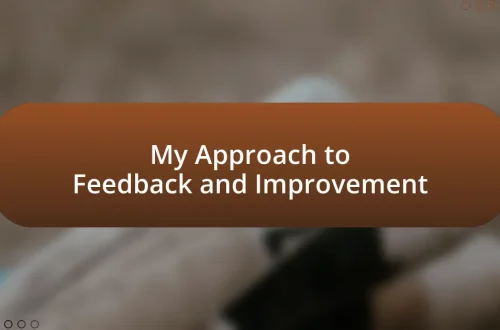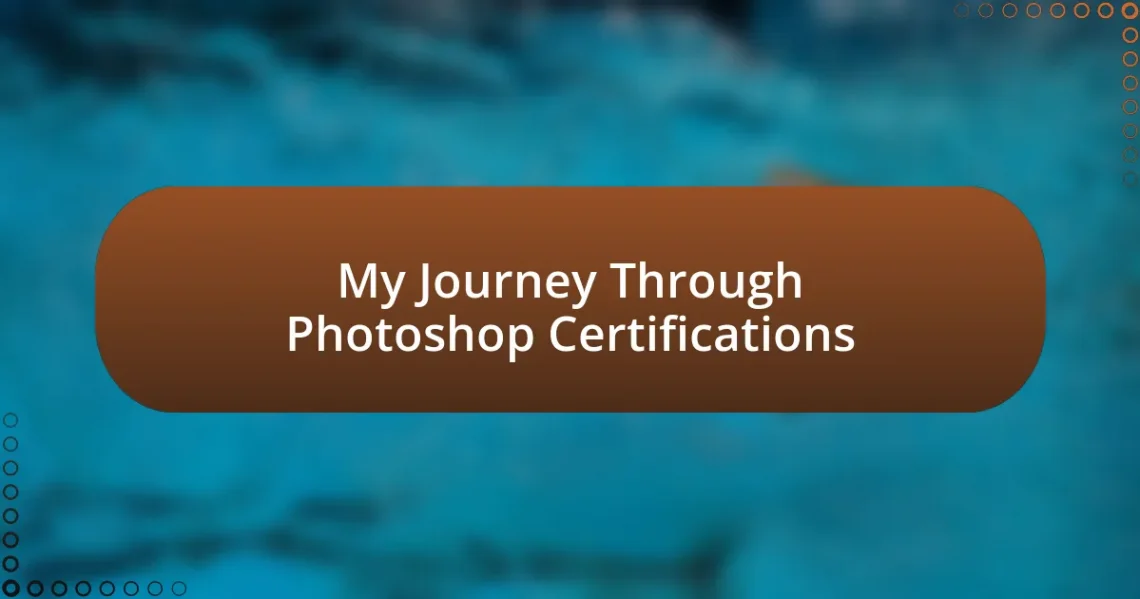
My Journey Through Photoshop Certifications
Key takeaways:
- Understanding the differences between Adobe Certified Associate (ACA) and Adobe Certified Expert (ACE) is vital for selecting the appropriate certification path based on personal goals.
- Effective preparation for Photoshop exams involves familiarization with exam objectives, utilizing official resources, and engaging in real projects.
- Building a strong portfolio post-certification should showcase diverse skills and include project descriptions that highlight problem-solving abilities.
- Continuing education and networking after certification are essential for staying updated and expanding creative skills in the evolving design field.
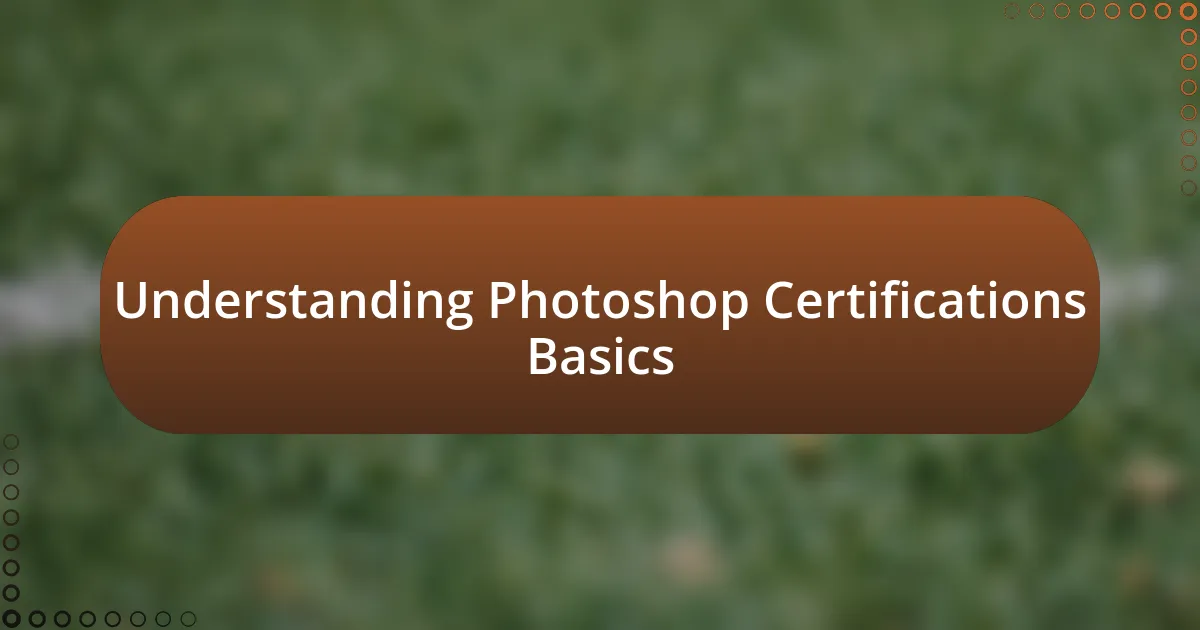
Understanding Photoshop Certifications Basics
Photoshop certifications can feel like a maze, especially when you first dive in. I remember staring at the certification options and feeling a sense of overwhelm—where do I even begin? It’s like stepping into a new world; understanding the differences between the Adobe Certified Associate (ACA) and Adobe Certified Expert (ACE) levels is a crucial starting point.
As I delved deeper into the certification process, I found that each level presented unique opportunities. The ACA focused more on foundational skills, while the ACE challenged me to master advanced techniques. Have you ever felt the thrill of pushing your creative boundaries? That’s exactly what pursuing these certifications ignited in me—a passion for continuous learning and personal growth.
What struck me most was how these certifications weren’t just about passing a test but about validating the skills I had honed over countless hours in front of the screen. It’s a journey of self-discovery and validation. While the journey might seem daunting at first, embracing the challenge can lead to newfound confidence in your creative abilities and even open doors to professional opportunities.
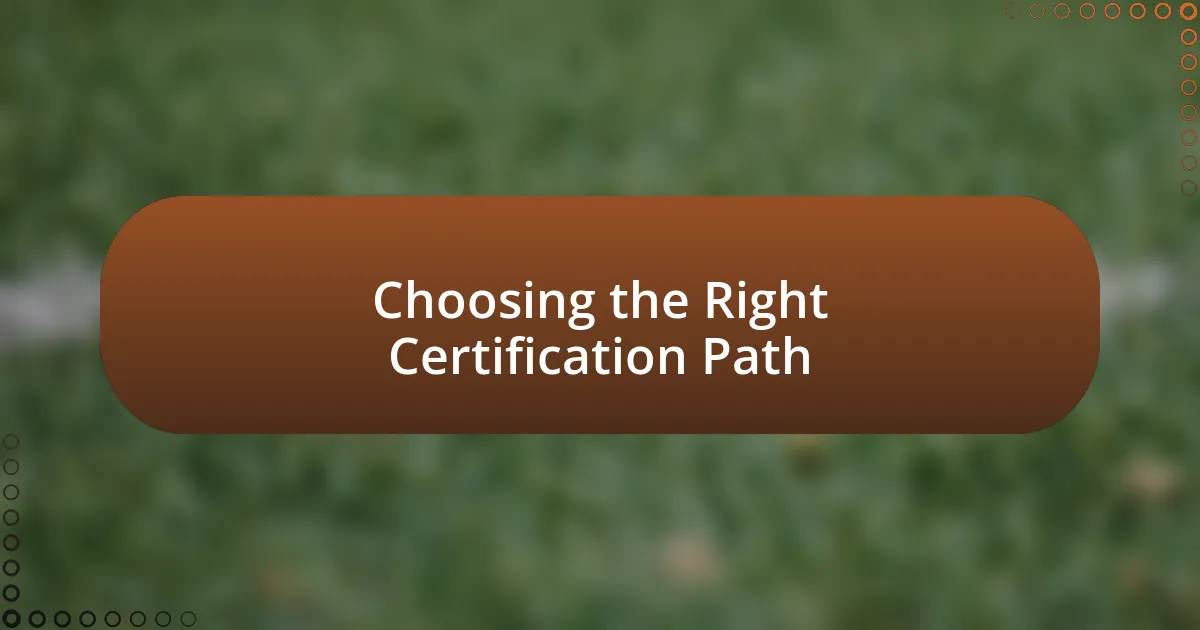
Choosing the Right Certification Path
Choosing the right path for your Photoshop certification can be tricky. When I was faced with this decision, I realized that my ultimate goals mattered most. Did I want to enhance my general skills or dive deeply into the expert level? Knowing what I wanted to achieve helped me navigate my options effectively.
As I explored various certifications, I found it beneficial to compare their focus areas and requirements. For example, the different levels cater to distinct experiences and career goals. Understanding this distinction made me reflect on my personal journey: would I be more fulfilled with a broader skill set or the mastery of specific advanced techniques?
To simplify the decision-making process, I compiled a table comparing key aspects of each certification. This visual tool was instrumental in clarifying what I needed to focus on and helped me make a more informed choice.
| Certification Level | Focus Area |
|---|---|
| Adobe Certified Associate (ACA) | Foundational skills for beginners |
| Adobe Certified Expert (ACE) | Advanced techniques for professionals |
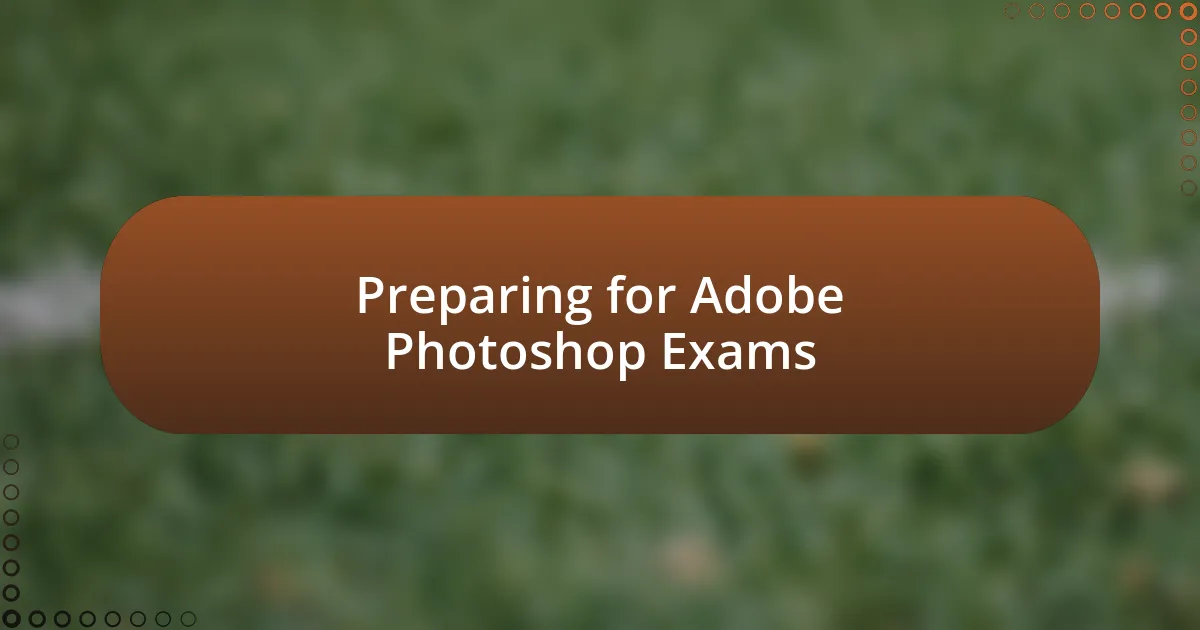
Preparing for Adobe Photoshop Exams
Preparing for the Adobe Photoshop exams can feel like an overwhelming journey, but I found that breaking it down made all the difference. Initially, I was apprehensive about the amount of content I needed to master, but I realized that consistent practice was key. Each time I sat down to study, I felt a surge of motivation, seeing how much I was progressing with each session.
To gear up effectively, here’s what I focused on during my preparation:
- Familiarize with the Official Exam Objectives: Understanding the key topics covered in the exam ensured I was on the right track.
- Utilize Adobe’s Resources: I found the official study guides and tutorials incredibly helpful for targeted learning.
- Practice with Real Projects: I engaged in personal projects that mirrored real-world scenarios, which not only solidified my knowledge but also kept my enthusiasm alive.
- Join Online Communities: Connecting with others on forums provided valuable insights and support. The shared experiences truly motivated me when I hit roadblocks.
- Mock Exams: Taking practice tests helped build my confidence and highlighted areas that needed extra attention before the actual exam.
It’s amazing how each small step contributed to my overall readiness and eased my anxiety leading up to test day. Looking back, I’m so grateful for the solid foundation these preparations provided.
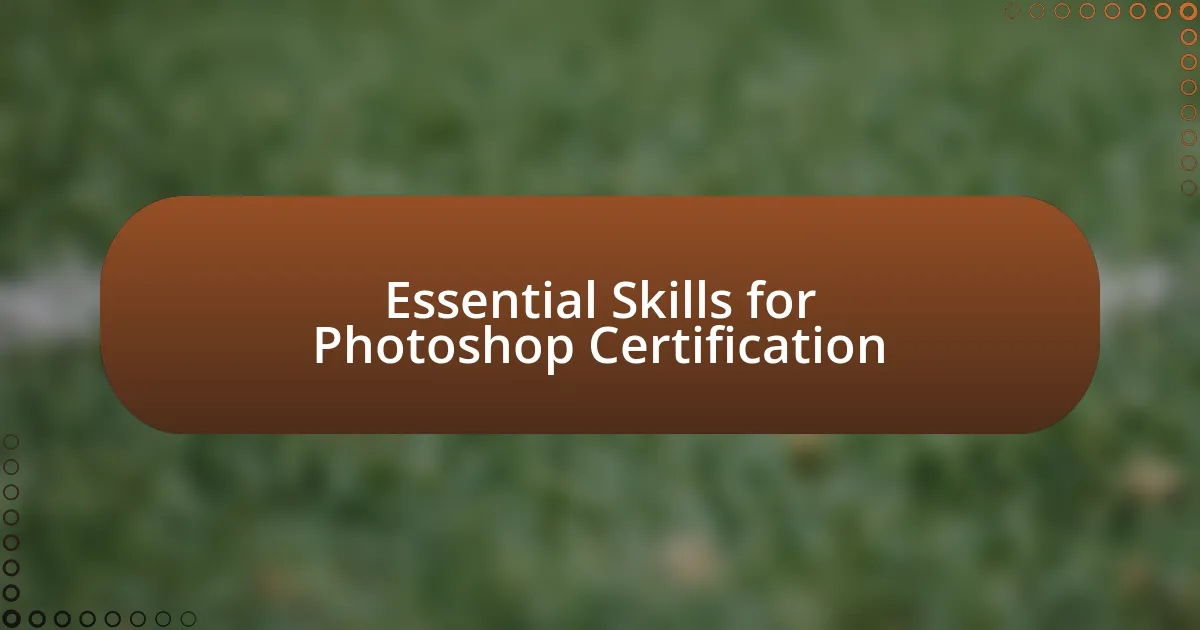
Essential Skills for Photoshop Certification
Essential Skills for Photoshop Certification
When I think about the essential skills for Photoshop certification, a few core competencies come to mind. Mastering layer management is crucial; I remember the first time I juggled multiple layers for a project—it felt like trying to conduct an orchestra! Understanding how to use adjustment layers and blending modes transformed my images and made my workflow more efficient. Can you imagine the impact of precision and control over every element in your design?
Another vital skill is proficiency with selection tools. Early on, I struggled with making clean selections, often feeling frustrated when the edges weren’t sharp. However, as I practiced and experimented with tools like the Quick Selection Tool and the Pen Tool, I became more confident in my abilities. Selecting the right areas can elevate a project immensely—think about how it changes the vibe of a composite image!
Lastly, familiarity with color theory is an area that significantly shaped my work. I had to grapple with the concept of complementary colors and how they influence mood and style in design. The moment I started applying color harmony consciously was like turning on a light switch; my designs began to resonate with audiences. Have you ever noticed how color can evoke certain feelings? It’s that understanding that truly sets a certification holder apart in the creative industry.
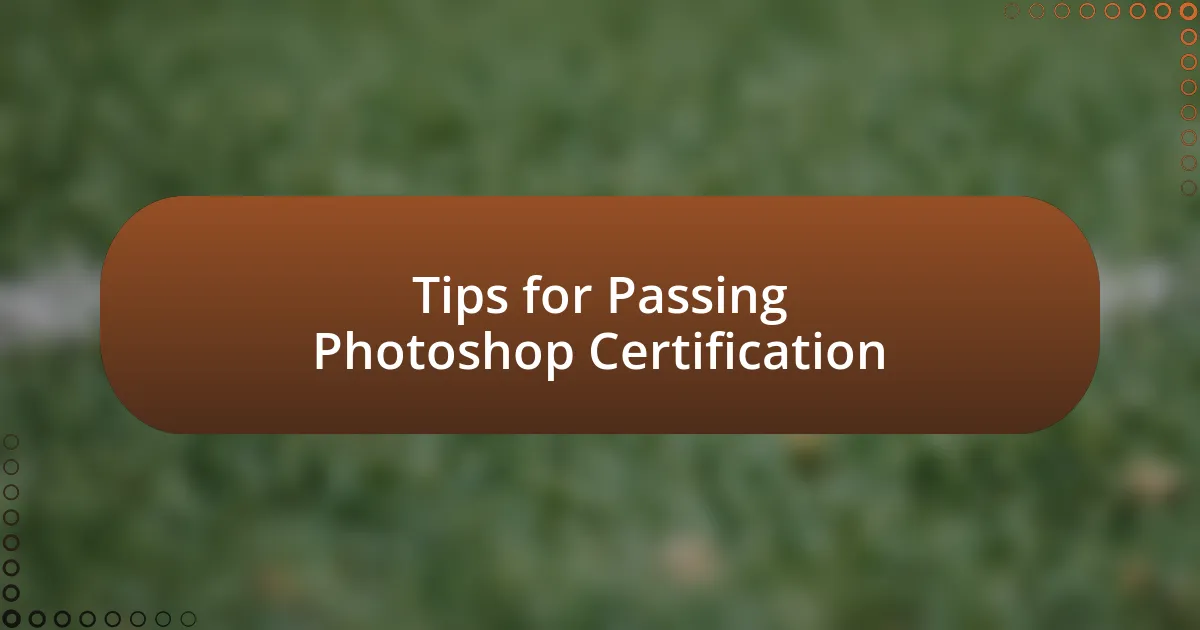
Tips for Passing Photoshop Certification
When preparing for your Photoshop certification, practicing with real-world projects can make all the difference. I fondly recall tackling a series of assignments that challenged my skills in retouching and compositing. Each completed project felt like a mini-celebration, reinforcing my confidence and helping me to grasp concepts in a practical way. Have you ever found that applying your knowledge in a tangible way reinforces learning?
Make sure to familiarize yourself with the exam format and the types of questions you might encounter. I remember feeling overwhelmed by the various styles of questions during my practice tests; it wasn’t until I flipped through countless sample questions that I realized the patterns. This preparation opened my eyes to potential gaps in my knowledge, allowing me to focus my study sessions effectively. Isn’t it fascinating how understanding the test itself can ease the anxiety of facing it?
Lastly, don’t underestimate the power of community. Joining forums or study groups was a game-changer for me. Sharing insights and discussing challenges with others not only motivated me but often provided perspectives that I hadn’t considered before. Have you ever had a breakthrough moment sparked by someone else’s experience? Those interactions truly enriched my journey towards certification.

Building a Portfolio Post-Certification
Once you’ve earned your Photoshop certification, building a strong portfolio becomes essential to showcase your skills. I remember selecting a few standout projects that reflected the diverse range of techniques I learned, from advanced retouching to intricate digital paintings. It felt rewarding to curate work that not only represented my growth but also resonated with my personal style. How do you choose which pieces highlight your abilities best?
In my experience, adding diverse projects to your portfolio can boost its appeal. I experimented with various styles, like minimalist designs and bold graphics, to demonstrate my versatility. Each piece told a story about my journey and my artistic capabilities, making it easier for potential clients to connect with my work. Have you ever thought about how your creativity can evolve through experimentation?
Don’t forget to include descriptions alongside your projects. When I first showcased my portfolio, I included notes on the challenges I faced and the solutions I implemented during each project. This not only added depth to my work but also provided insights into my problem-solving skills. What’s your approach to communicating your creative process to others?
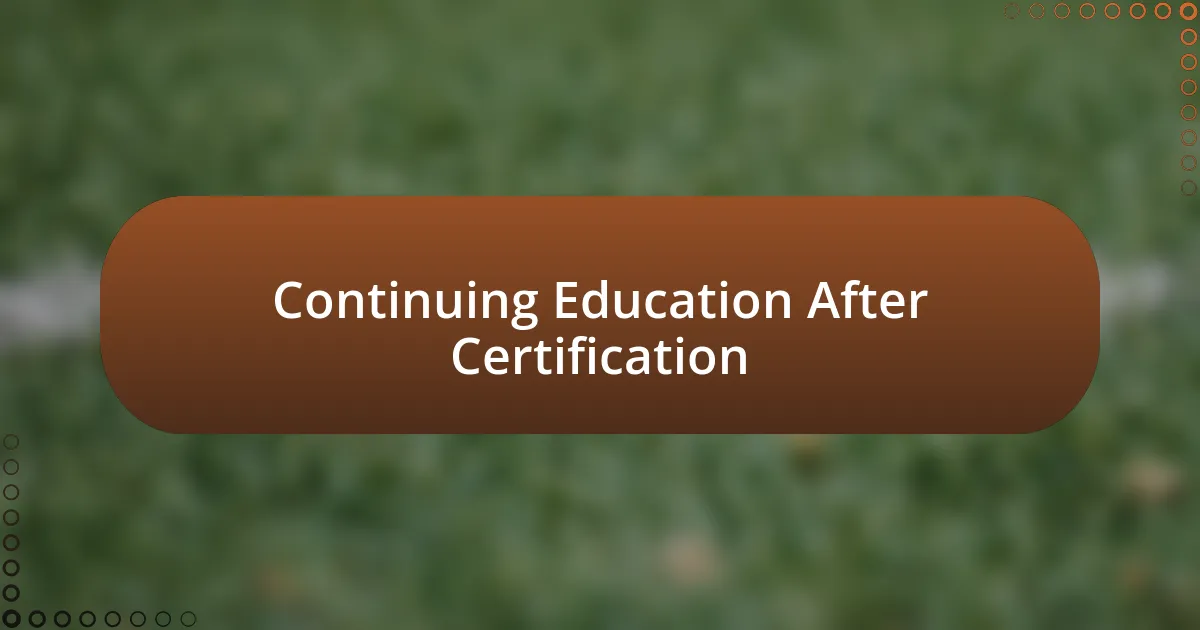
Continuing Education After Certification
Continuing education after earning your Photoshop certification is crucial for staying relevant in a constantly evolving field. I vividly recall attending workshops and online courses to explore the latest features and tools in Photoshop. These experiences not only refreshed my skills but also ignited new creative passions I hadn’t yet discovered.
As I navigated through advanced techniques and specialized courses, I found that each new knowledge piece I picked up added layers to my understanding. For example, learning about color theory in a dedicated class transformed how I approached my projects. I often ask myself, “How can I enhance my work by expanding my skill set?” and the answer has always been clear—continuous learning is key.
Networking events are another valuable avenue for education. When I attended a local design conference, I found myself surrounded by industry leaders and fellow creatives who shared their insights and experiences. Their stories inspired me to think outside the box and encouraged me to seek out unconventional sources of learning. Have you considered how connecting with others in your field can further your education and open new doors?




